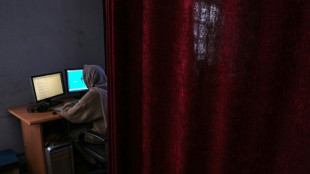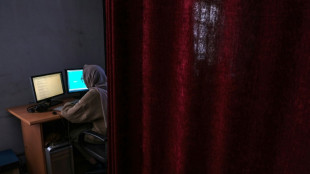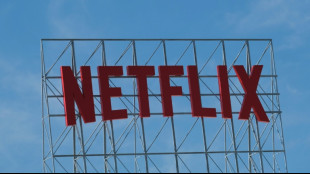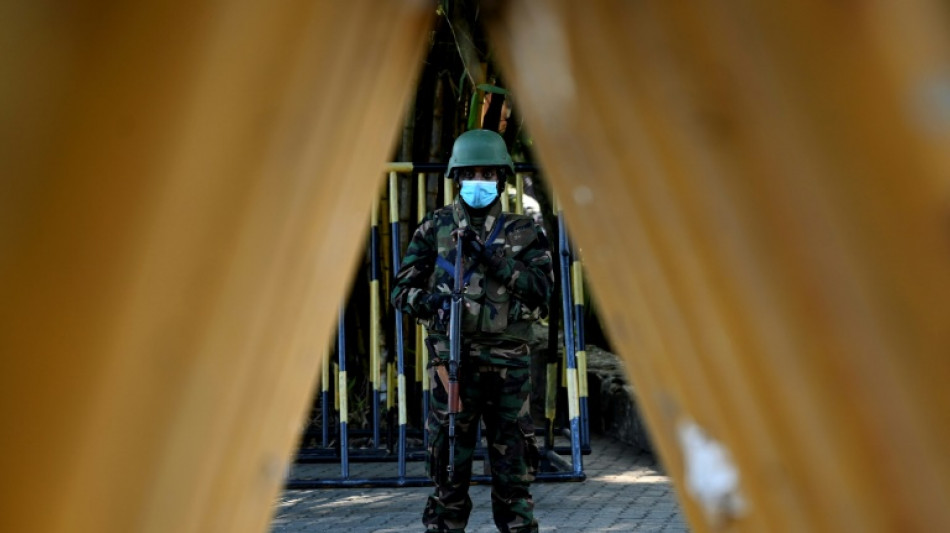
-
 Sweden reels from worst mass shooting in its history
Sweden reels from worst mass shooting in its history
-
India's Modi takes ritual dip at Hindu mega-festival

-
 Nissan shares fall as reports say Honda merger talks off
Nissan shares fall as reports say Honda merger talks off
-
US Postal Service says suspending parcels from China

-
 Toyota announces Lexus EV plant in Shanghai
Toyota announces Lexus EV plant in Shanghai
-
Santander reports record profit for third straight year

-
 No new clothes: S. Korean climate activist targets hyperconsumption
No new clothes: S. Korean climate activist targets hyperconsumption
-
Cummins 'hugely unlikely' for Australia's Champions Trophy bid

-
 Nissan shares plunge as report says Honda merger talks off
Nissan shares plunge as report says Honda merger talks off
-
China holds out hope last-minute deal can avert US trade war

-
 LeBron relishing 'special' Doncic double act
LeBron relishing 'special' Doncic double act
-
Tatum shines as Celtics down Cavs, Lakers thrash Clippers

-
 Myanmar junta bid to sell Suu Kyi mansion flops for third time
Myanmar junta bid to sell Suu Kyi mansion flops for third time
-
Australia bans DeepSeek AI program on government devices

-
 Olympics on horizon as China hosts Asian Winter Games
Olympics on horizon as China hosts Asian Winter Games
-
Tatum, White shine as Celtics down Cavs

-
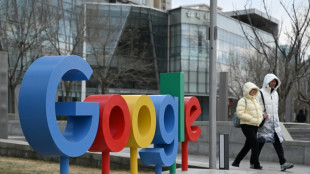 Google pledge against using AI for weapons vanishes
Google pledge against using AI for weapons vanishes
-
African football has the platform for historic World Cup success

-
 France prop Gros happy to go 'under radar' for Dupont's benefit
France prop Gros happy to go 'under radar' for Dupont's benefit
-
Bove's future uncertain after heart attack horror as Fiorentina finish Inter clash

-
 Race against time to complete contested Milan-Cortina bobsleigh track
Race against time to complete contested Milan-Cortina bobsleigh track
-
Speed queen Goggia pursuing Olympic dreams with 2026 Winter Games on horizon

-
 Asian markets stutter as traders weigh China-US trade flare-up
Asian markets stutter as traders weigh China-US trade flare-up
-
French PM set to survive no confidence vote

-
 Trump says US will take over Gaza, create 'Riviera of the Middle East'
Trump says US will take over Gaza, create 'Riviera of the Middle East'
-
Google shares slide on spending plans despite sales jump

-
 Honda shares jump on reports it wants Nissan as subsidiary
Honda shares jump on reports it wants Nissan as subsidiary
-
Trump says US will 'take over' Gaza as he welcomes Netanyahu

-
 Netflix drops 'Emilia Perez' star Oscar bid over offensive posts: reports
Netflix drops 'Emilia Perez' star Oscar bid over offensive posts: reports
-
Sirianni embraces emotions ahead of Chiefs rematch

-
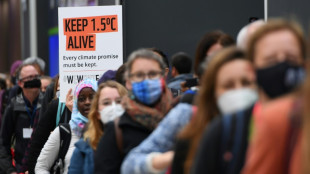 Top climate scientist declares 2C climate goal 'dead'
Top climate scientist declares 2C climate goal 'dead'
-
US Treasury says Musk team has 'read-only' access to payments data

-
 Leaders 'should respect' wishes of Palestinians to stay in Gaza: Palestinian UN envoy
Leaders 'should respect' wishes of Palestinians to stay in Gaza: Palestinian UN envoy
-
Paris Saint-Germain, Brest, Dunkerque advance to French Cup last eight

-
 Simeone brace helps Atletico thrash Getafe, reach Copa del Rey semis
Simeone brace helps Atletico thrash Getafe, reach Copa del Rey semis
-
Trump hosts Netanyahu for pivotal Gaza ceasefire talks

-
 Atletico thrash Getafe to reach Copa del Rey semis
Atletico thrash Getafe to reach Copa del Rey semis
-
Stocks recover but tariff uncertainty lingers over market

-
 Shiffrin to sit out world team combined, dashing Vonn hopes
Shiffrin to sit out world team combined, dashing Vonn hopes
-
Mahomes avoids 'G.O.A.T' talk as history beckons

-
 Undav sends Stuttgart into German Cup final four
Undav sends Stuttgart into German Cup final four
-
Alcaraz battles through in first match since Australian Open

-
 Trump backs jailing Americans in El Salvador if has 'legal right'
Trump backs jailing Americans in El Salvador if has 'legal right'
-
What Elon Musk's Twitter tactics may bode for US government

-
 Trump signs order withdrawing US from UN bodies
Trump signs order withdrawing US from UN bodies
-
'Bodies on the ground': mass shooting shocks Sweden's Orebro

-
 Rubio brushes aside aid uproar
Rubio brushes aside aid uproar
-
Rubio accuses Cuba, Nicaragua, Venezuela over migration crisis

-
 Ex-world number one Halep announces retirement after home defeat
Ex-world number one Halep announces retirement after home defeat
-
Trump taps 'Sharpiegate' meteorologist to lead top science agency
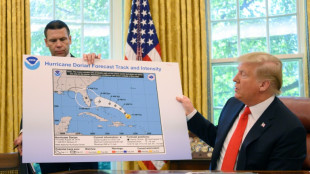

Sri Lanka protesters defy curfew after social media ban
Armed troops in Sri Lanka had a tense confrontation with a crowd protesting a worsening economic crisis on Sunday, after a social media blackout failed to halt another day of anti-government demonstrations.
The South Asian nation is facing severe shortages of food, fuel and other essentials -- along with record inflation and crippling power cuts -- in its most painful downturn since independence from Britain in 1948.
President Gotabaya Rajapaksa imposed a state of emergency on Friday, the day after a crowd attempted to storm his home in the capital Colombo, and a nationwide curfew is in effect until Monday morning.
The Samagi Jana Balawegaya (SJB), Sri Lanka's main opposition alliance, denounced a social media blackout aimed at quelling intensifying public demonstrations, and said it was time for the government to resign.
"President Rajapaksa better realise that the tide has already turned on his autocratic rule," SJB lawmaker Harsha de Silva told AFP.
Troops armed with automatic assault rifles moved to stop a protest by opposition lawmakers and hundreds of their supporters attempting to march to the capital's Independence Square.
The road was barricaded a few hundred metres from the home of opposition leader Sajith Premadasa and the crowd engaged in a tense stand-off with security forces for nearly two hours before dispersing peacefully.
Eran Wickramaratne, another SLB lawmaker, condemned the state of emergency declaration and the presence of troops on city streets.
"We can't allow a military takeover," he said. "They should know we are still a democracy."
- Social media blackout -
Internet service providers were ordered to block access to Facebook, WhatsApp, Twitter and several other social media platforms but the blackout did not deter several small demonstrations elsewhere in Sri Lanka.
Police fired tear gas to disperse university students in the central town of Peradeniya, though protests in other parts of the country ended without incident.
Private media outlets reported that the chief of Sri Lanka's internet regulator resigned after the ban order went into effect.
The blackout was rescinded later in the day after the country's Human Rights Commission ruled that the defence ministry had no power to impose the censorship.
The streets of Colombo stayed largely empty on Sunday, apart from the opposition protest and long lines of vehicles queued for fuel.
But police told AFP that one man had died by electrocution after climbing a high-tension pylon near Rajapaksa's home. Residents said he was protesting rolling power cuts.
Mass protests had been planned for Sunday before the social media blackout went into effect, but organisers have postponed the rallies until after the curfew is lifted on Monday.
- Internal rifts -
The escalating protests have led to fissures within the government, with the president's nephew Namal Rajapaksa condemning the partial internet blackout.
"I will never condone the blocking of social media," said Namal, the country's sports minister.
A junior party has also hinted it may leave the ruling coalition within a week.
The move would not threaten the government's survival but threatens its chances of lawfully extending the country's state of emergency ordinance.
Western diplomats in Colombo have expressed concern over the use of emergency laws to stifle democratic dissent and said they were closely monitoring developments.
Sri Lanka's influential Bar Association has urged the government to rescind the state of emergency, which allows security forces to arrest and detain suspects for long periods without charges.
Solidarity protests were staged elsewhere in the world over the weekend including in the Australian city of Melbourne, home to a large Sri Lankan diaspora.
A critical lack of foreign currency has left Sri Lanka struggling to service its ballooning $51 billion foreign debt, with the pandemic torpedoing vital revenue from tourism and remittances.
The crisis has also left the import-dependent country unable to pay even for essentials.
Diesel shortages have sparked outrage across Sri Lanka in recent days, causing protests at empty pumps, and electricity utilities have imposed 13-hour blackouts to conserve fuel.
Many economists also say the crisis has been exacerbated by government mismanagement, years of accumulated borrowing, and ill-advised tax cuts.
Sri Lanka is negotiating with the International Monetary Fund for a bailout.
T.Bondarenko--BTB

